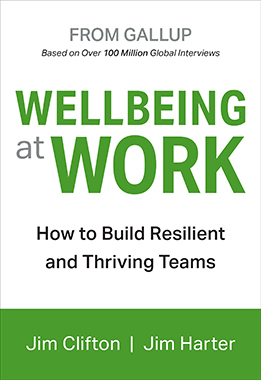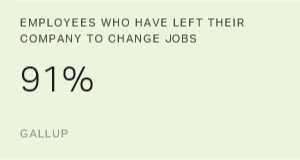Gallup scientists have been exploring the demands of a life well-lived since the mid-20th century. More recently, in partnership with leading economists, psychologists, and other acclaimed scientists, we began to explore the common elements of well-being that transcend countries and cultures.
In our initial research, we asked people what "the best possible future" for them would look like.
As part of this research, Gallup conducted a comprehensive global study of more than 150 countries, giving us a lens into the well-being of more than 98% of the world's population. From Afghanistan to Zimbabwe, we asked hundreds of questions about health, wealth, relationships, jobs, and communities. We then compared these results to how people experience their days and evaluate their lives overall.
In our initial research, we asked people what "the best possible future" for them would look like. We found that when evaluating their lives, people often give disproportionate weight to income and health: Across the groups we surveyed, "good health" and "wealth" were two of the most common responses. Perhaps this is because these things are easy to measure and track over time -- we can monitor our height, weight, blood pressure, and household income. Yet we do not have a standard way to measure the quality of our careers or the health of our relationships.
So to construct a comprehensive measure of individual well-being, Gallup designed an assessment composed of the best questions we have asked over the last 50 years. To create this assessment, the Well-Being Finder, we tested hundreds of questions across countries, languages, and vastly different life situations.
Upon completion of the research, five distinct statistical factors emerged. These are the universal elements of well-being that differentiate a thriving life from one spent suffering. They describe aspects of our lives that we can do something about and that are important to people in every situation we studied.
The elements
These elements are the currency of a life that matters. They do not include every nuance of what's important in life, but they do represent five broad categories that are essential to most people.
-
The first element is about how you occupy your time or simply liking what you do every day: your Career Well-Being.
-
The second element is about having strong relationships and love in your life: your Social Well-Being.
-
The third element is about effectively managing your economic life: your Financial Well-Being.
-
The fourth element is about having good health and enough energy to get things done on a daily basis: your Physical Well-Being.
-
The fifth element is about the sense of engagement you have with the area where you live: your Community Well-Being.
While 66% of people are doing well in at least one of these areas, just 7% are thriving in all five. If we're struggling in any one of these domains, as most of us are, it damages our well-being and wears on our daily life. When we strengthen our well-being in any of these areas, we will have better days, months, and decades. But we're not getting the most out of our lives unless we're living effectively in all five.
Although these elements are universal across faiths, cultures, and nationalities, people take different paths to increasing their individual well-being. For many people, spirituality drives them in all these areas. Their faith is the most important facet of their lives, and it is the foundation of their daily efforts. For others, a deep mission, such as protecting the environment, inspires them each day. While the things that motivate us differ greatly from one person to the next, the outcomes do not.
There are many ways to create thriving Career, Social, Financial, Physical, and Community Well-Being. Because these critical elements are within our control, we have the ability to improve them (for example, exercising, spending more time with friends, or using money wisely). However, the single biggest threat to our own well-being tends to be ourselves. Without even giving it much thought, we allow our short-term decisions to override what's best for our long-term well-being.
Working against our own best interests
We know that physical activity will improve our health, yet we skip exercising. Missing one workout won't give us a heart attack or cause a stroke -- so we let ourselves off the hook for a day.
We know that too much sugar and fried foods are bad for our health. But we grab a handful of candy or chips without even thinking. One french fry can't cause diabetes or obesity, right?
As long as we allow short-term desires to win, it will be difficult to effect long-term behavioral change.
Similarly, we know it's important to spend quality time with our friends and family, but when work is pressing, we don't stop to ask a friend how he is doing.
When we think about our personal finances, we often spend instead of saving. Putting money into a retirement plan would yield several times its original value later on, but spending it on an indulgent purchase is so much more appealing right now.
With so many options to satisfy ourselves in the moment, it can be difficult to make the right long-term decisions. It is, after all, in our nature to do things that will provide the most immediate reward. This is wired into our DNA for basic survival. For decades, psychologists have described increases in the ability to delay gratification as a cornerstone of human development from childhood to adulthood.
But the reality is, our short-term self still wins and gets dessert, despite objections from our long-term self that wants a healthy body and a long life. For example, when we asked more than 23,000 people about their purchasing habits, only 10% said that they buy candy regularly. But when we asked the same group of people later in the survey if there was a bowl of candy sitting right in front of them if they would eat some, more than 70% admitted they would.
As long as we allow short-term desires to win, it will be difficult to effect long-term behavioral change. However, we learned from people with the highest levels of well-being that there is a simple solution to this problem: If we can find short-term incentives that are consistent with our long-term objectives, it is much easier to make the right decisions in the moment.
For example, we're more likely to skip a cheeseburger and fries not when we ponder the long-term risk of obesity or diabetes, but when we consider the short-term reality that devouring it will lead to a "high-fat hangover" that ruins the rest of the day. Or we might choose to exercise tomorrow morning because we know that just 20 minutes of activity can boost our mood for the next 12 hours.
When we can see an immediate payoff, we are more likely to change our behavior in the moment. This aligns our daily actions with our long-term interests.
References
Gallup, G., & Hill, E. (1960). The secrets of a long life. New York: Bernard Geis.
Schelling, T.C. (1978). Egonomics, or the art of self-management. The American Economic Review, 68(2), 290-294.
Sibold, J.S., & Berg, K. (2009, May 29). Mood enhancement persists for up to 12 hours following aerobic exercise. Poster session presented at the annual meeting of the American College of Sports Medicine, Seattle, WA.



